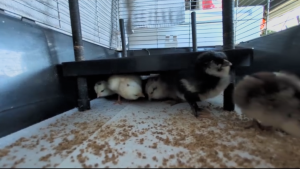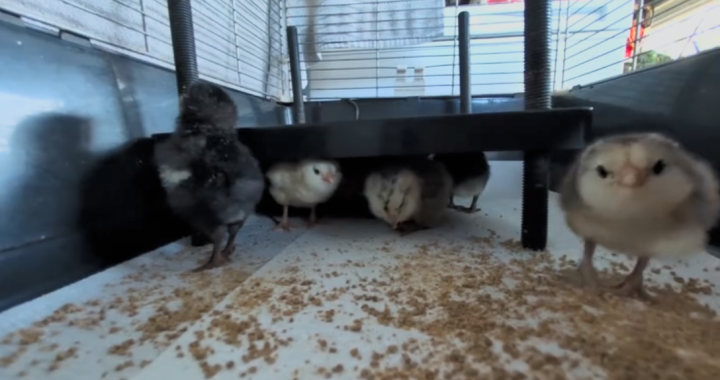How to Take Care of Day-Old Chicks: A Beginner’s Guide

Raising day-old chicks can be an incredibly rewarding experience. These tiny, fluffy creatures need a lot of care and attention in their early days to ensure they grow up healthy and strong. Here’s a step-by-step guide to get you started on your journey of raising happy, healthy chicks. (Most chick breeders will happily answer any questions you have – stay in touch to reach out with questions or concerns.)
Preparing the Brooder
Before bringing your chicks home, you’ll need to set up a brooder. This is a warm, safe space where the chicks can grow during their first few weeks of life.
- Container: Choose a large, sturdy container, such as a plastic bin or a wooden box.
- Bedding: Line the bottom with paper towels for the first week or two while the chicks are learning to eat. This makes for easy clean up and the food is more accessible to them. When they are ready for a chick trough feeder you can switch to pine shavings.
- Heat Source: Use a brooder plate to help the chicks maintain their body temperature. Gradually raise the plates height to accommodate the chicks as they grow. (If you decide to use a heat lamp keep the brooder temperature at around 95°F (35°C) for the first week then decrease the temperature by 5°F each week.) Once they are fully feathered (at around 6 weeks) they will no longer need an outside heat source.
Feeding and Watering
Chicks require a specific diet to support their rapid growth.
- Starter Feed: Provide a high-quality chick starter feed that contains essential nutrients. We use Purina Starter Grower chick crumbles – Medicated for our new birds.
- Fresh Water: Ensure they have access to clean, fresh water at all times. Use a shallow waterer to prevent drowning. You will have to clean the waterer a lot more than you’d expect as they dirty it amazingly fast.
- Treats: Chickens love treats but small chicks should not be given treats frequently. They are growing so fast that all their food needs to support their healthy growth. Limit any treats to the occasional scatter of mealworms until they are fully feathered and ready to play outside. (Even then, do not over treat them – laying chickens need a very specific diet to keep them in their prime.)
Teaching the babies to eat
If you have hatched your own chicks from eggs you may need to teach the new babies how to eat once you put them in the brooder. It’s super easy! Just tap, tap, tap at the food with your fingertip – mimicking a hens beak pecking and the chicks will immediately start imitating you. With water you need to gently put a chick’s beak into the water and let go – you don’t need to hold them there. Once they feel their beak getting wet they will understand how to drink. Usually, you only have to show one or two chicks how to drink before the rest of them learn it by watching.
Handling and Socializing
Social interaction is crucial for the chicks’ development. Never raise a single chick. Chickens are flock dependent and do not do well on their own. Always have two or more together.
- Gentle Handling: Handle the chicks gently and frequently to get them used to human contact.
- Wash Your Hands: Before and After handling chicks always wash your hands. Chickens can carry several harmful diseases that soap and water will prevent.
- Time with Other Chicks: Allow them to interact with each other to develop social behaviors.
Health and Safety
Monitoring the health of your chicks is essential to prevent diseases.
- Check for Illness: Regularly check for signs of illness, such as lethargy, sneezing, or diarrhea. Quiet chicks are happy chicks – if you aren’t sure about their state just listen. Chicks that are making a lot of noise are seeking to get a need met, food, water, heat, cooling, company. If your chicks are loud, check on them.
- Heat Related Issues: Chicks need heat, but they also need to be able to escape the heat – overheated chicks will die as quickly as cold ones. This is why we recommend a brooder plate as it mimics the natural way chicks warm up under a hen and they can simply disengage with the plate to cool down.
- Pasty Butt is the most common disorder in chicks, which is why we recommend medicated feed during their first few vulnerable weeks. If your chick(s) have poop stuck on the outside of their behinds do not pull at it – you can disembowel the bird in the removal attempt. Soak the chick’s butt in warm water and wipe it away.
- Vaccinations: If you purchase day old chicks from a large hatchery, consider vaccinating your chicks for common diseases like Marek’s disease. Chicken vaccines outside of the hatchery are uncommon and not offered by most animal care providers. (This being said, we have never lost a chicken to a vaccine preventable disease – but always get them vaccinated when ordering from a hatchery).
Transitioning to the Coop
Once the chicks are fully feathered (around 6-8 weeks old), they can be moved to a more permanent home.
- Gradual Introduction: If these are your first chickens gradually introduce them to the outdoors by allowing them to spend short periods in the coop during the day. (See below if your new birds will join an existing flock).
- Secure Coop: Ensure the coop is predator-proof and provides adequate shelter and ventilation.
- Chicken Wire is only good for keeping chicken contained, it will not deter any predator that may be looking for a chicken dinner. Always secure your coop/run with hardware cloth.
- Introducing to an existing flock: The easiest way we’ve found to introduce new chicks to our main flock has been to either move their brooder into the coop for a 7 to 10 days prior to releasing them or to put them in a grow out pen adjacent to the main coops run. This allows the birds to get to know each other and be accepted before they can be physically interacted with. Do not introduce small chicks into an adult flock as they will mostly likely be killed, wait until your chicks are almost as big as the grown ups to move them into a shared space.
Raising chicks can be a delightful journey filled with learning and joy. By providing them with the right care, you’ll help them grow into healthy, happy chickens.
Happy chick raising!

Products we use:


Thank you so much for your excellent advice. I’ve had chicks many years ago but wanted a reminder. I’ve really missed my girls, and am really looking forward to the arrival of my new babies.